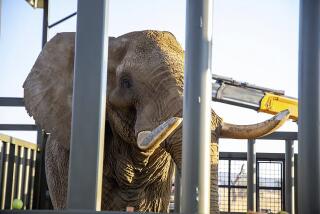Team Dislodges Dead Fetus in First Elephant C-Section
- Share via
Veterinary surgeons Monday performed the first-ever Cesarean section on an elephant, removing a dead fetus in an attempt to save the life of the mother, a 7,000-pound pachyderm more than 70 days overdue.
Jean, a 19-year-old Asian elephant at the San Diego Wild Animal Park, was revived just five minutes after the 4-hour, 5-minute operation was complete, and park officials expressed guarded optimism about her condition.
“We didn’t know if she’d make it. We’re very pleased, obviously, that she did,” said Tom Hanscom, a spokesman for the park. The entire procedure, from the time the elephant was given anesthesia to the time she stood up, took 4 hours, 45 minutes.
“We still regard her condition as a serious one. We’re guarded in our prognosis.”
The unprecedented surgery, performed by an 11-member team, was extremely risky, Hanscom said, because of Jean’s size and the condition of her decomposing fetus, a large, mature female calf that appeared to weigh 300 pounds.
Doctors were concerned about the 2-foot incision, Hanscom said, because the sutures used to close it must support as much as 3,000 pounds of Jean’s body weight. One of the main concerns now, he said, is to guard against an infection in the animal’s abdominal cavity.
Once the elephant was cut open, doctors encountered large amounts of pus and decaying tissue, Hanscom said. After the calf was removed, Jean’s uterus was closed and the abdominal cavity was flushed with a sterile saline solution. A topical antibiotic was placed on the open area and she was then sutured.
She will now be given a systemic antibiotic, Hanscom said, adding that it will be days before they know whether Jean’s abdominal tissue is infected.
Doctors had wanted to have the elephant under anesthesia for only three hours but were unable to meet that goal. Moments before Jean awakened, the matriarch of the herd was brought into the barn. When Jean, behind bars, saw the matriarch, the two intertwined their trunks.
“Just as if you were at a hospital and were coming out of surgery, you’d want a loved one right there. That’s what we did, it’s the same psychological benefit,” Hanscom said. “It was quite a touching moment and everybody cried.”
Later, all the herd was brought into the barn. Though they can’t touch the wound because Jean is behind bars, they can touch her trunk.
Doctors believe the fetus died in mid-September when it became stuck during preliminary birth contractions. Since then, park veterinarians have given the mother hormone treatments in an attempt to induce labor. Last week, they tried to reposition the fetus in Jean’s uterus so that it could be pulled free, but were unsuccessful.
Jean had set a world record for the longest known elephant pregnancy--about 740 days. The longest prior recorded gestation ended after 720 days when an elephant in West Germany gave birth to a healthy calf. Normal gestation for an elephant is 615 to 668 days.
Recently, however, Jean had lost about 500 pounds and lacked energy, Hanscom said. On Friday, fearing that Jean was becoming infected, park officials decided to operate.
A team of three experienced horse surgeons, six veterinarians and two anesthesiologists spent 90 minutes making an incision and removing the fetus, Hanscom said.
The rest of the surgery, which was performed in a special stall in the park’s elephant barn, was spent cleaning and suturing the wound. Doctors worked against the clock to revive Jean, since elephants can lie on their sides for only eight to 10 hours before their weight begins to crush vital organs.
It is unlikely that Jean will be able to reproduce, Hanscom said.
As soon as possible, Jean will be allowed to mix with the rest of the elephant herd.
Times staff writer Armando Acuna contributed to this report.
More to Read
Sign up for Essential California
The most important California stories and recommendations in your inbox every morning.
You may occasionally receive promotional content from the Los Angeles Times.










